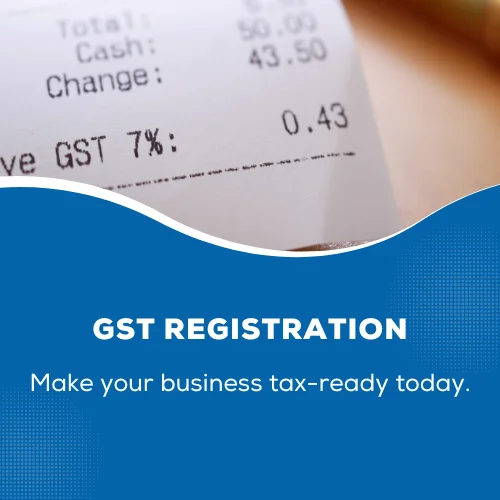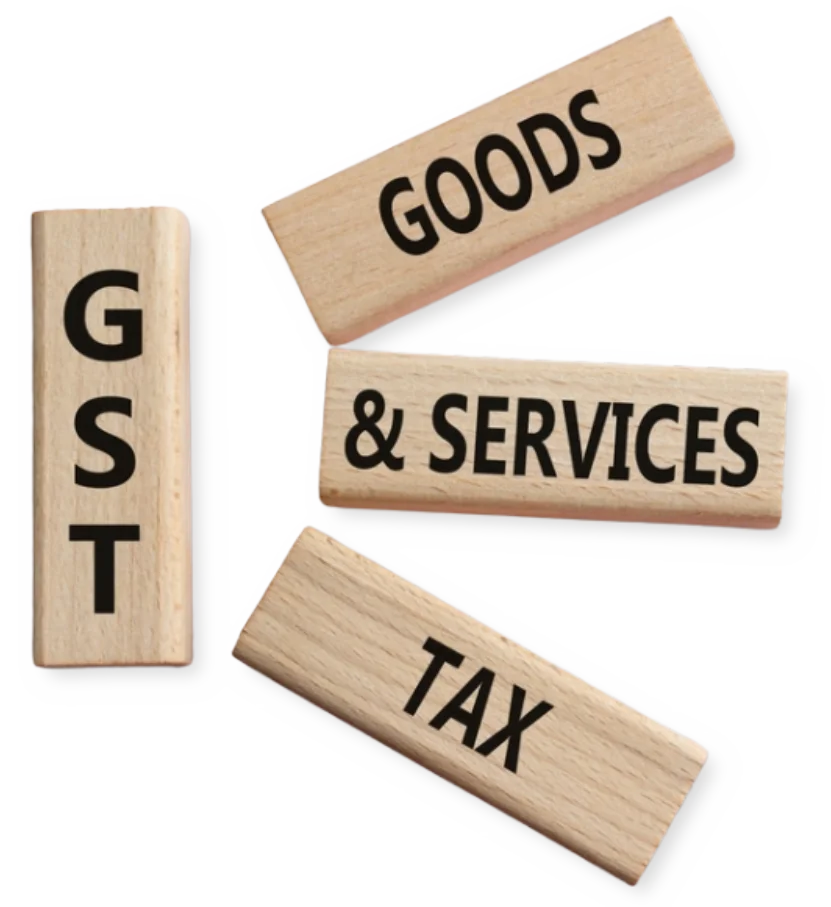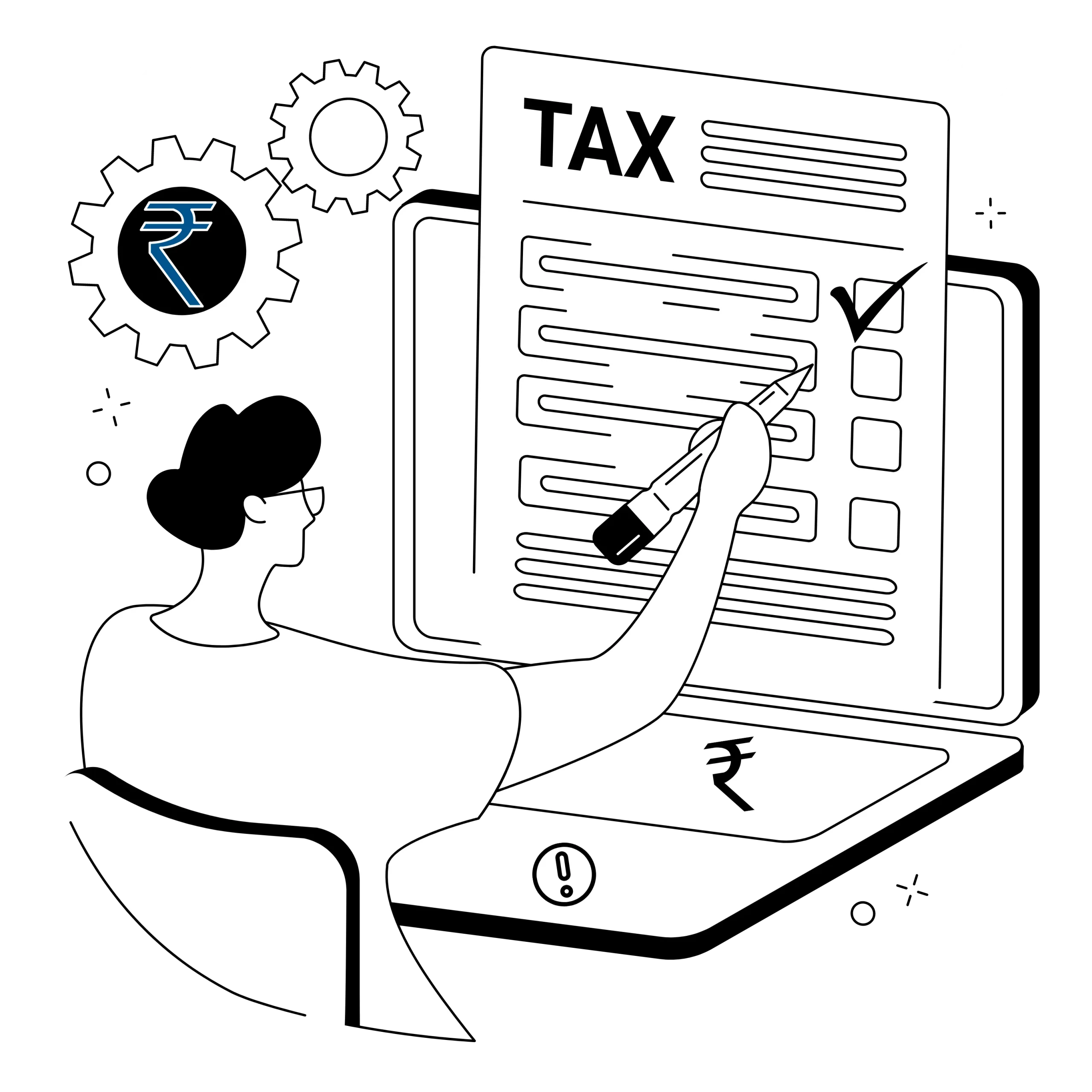GST Registration
New Business?
Get Your GST Registration Today!

Apply for GST Registration Today Just @ ₹999/-
- Get Instant Quote
What’s Included ✅
- Consultation on GST Applicability & Eligibility
- Preparation & Filing of GST Registration Application
- Assistance with Required Documentation
- GSTIN Allotment & Certificate Download
- Guidance on GST Compliance & Returns
- Expert Support till Successful Registration

Exclusive Free Benefits 🎁
- Free Consultation on GST Applicability
- Free Guidance on Input Tax Credit (ITC) Claims
- Free Checklist for Monthly GST Compliance (PDF)
- Free Consultation on E-Invoicing & GST Returns
- Free Bank Account Opening Assistance (if required)
- Consultation with CA/CS/Advocate Free for Lifetime
10,000+ Companies & Individuals Put Their Trust In Us
























✅ Clear Guidance: They explained every step in simple, easy-to-understand terms, so I always knew what was happening.
✅ Fast & Efficient: My filing was completed quickly without any unnecessary delays.
✅ Accuracy & Trust: I felt confident knowing my details were handled with care and precision.
✅ Great Support: Any small questions I had were answered patiently and thoroughly.
Online GST Registration
GST (Goods and Services Tax), the historic tax reform was launched at midnight on 30th June-1st July 2017 in New Delhi. Since this tax was levied on selling products and services, GST has replaced several taxes, such as VAT, service tax, and sales tax.
This tax implementation has thoroughly enhanced our country’s indirect tax regime. Also, it has lowered the declining impact of taxes. Goods and Services Tax allows taxpayers to claim their ITC (input tax credit). In a nutshell, it has caused unified taxation across India, simplifying tax compliances and improving the tax collection process.
If a business revenue exceeds specific threshold levels or comes under particular categories that need to register for GST, it is necessary to register following the rules. At Click To Professionals, we can help you get your GST registration effortlessly.

An Analysis of GST Registration in India
Goods and Services Tax, or GST, is an indirect, multi-stage, and destination-based tax system. Businesses that make more than ₹40 lakhs a year in sales of goods and ₹20 lakhs a year in sales of services should sign up for GST and pay taxes on their taxable goods and services. Small businesses that make less than ₹40 lakhs a year are not required to sign up for GST, but they can if they want to. By doing this, they can get benefits from the input tax credit. It is important to note that states in the special category have their own minimum thresholds. For goods, it is ₹20 lakhs and for services, it is ₹10 lakhs.
GST registration in India provides legal identity and ensures tax compliance for organizations and businesses dealing with products and services. The GST registration process is compulsory for organizations that reach a certain revenue level. This procedure includes different basic steps, such as discovering the GST registration type required, completing an e-learning course to gain an intense understanding of GST laws, and applying through the GST registration government website.
A GSTIN (Goods and Services Tax Identification Number) is usually known as a GST number in India. This number contains 15 digits (first two digits represent the state code where a business is registered, next ten digits are the PAN of the individual or business entity, next one digit represents the PAN holder’s entity code, next one digit is presently kept blank for using in the future, and the last one digit is a check code for verification purposes), which is different for every taxpayer, and it acts as their recognition under the GST regulations. Businesses should share essential documents, including Aadhar, PAN, bank account details, and proof of business incorporation, to complete GST registration online.
Generally, GST registration takes between two and six working days. Experts at Click To Professionals can help you complete your GST registration step easily and quickly.
Types of GST Registration in India
The primary types of GST registered in India are as follows:
SGST (State Goods and Services Tax)
- This applies to selling goods or services within the limits of a state.
UTGST (Union Territory Goods and Services Tax)
- Goods and services sold in union territories such as Daman and Diu, Andaman and Nicobar Islands, Chandigarh, Lakshadweep, and Dadra and Nagar Haveli are subject to this tax. It is levied along with CGST.
IGST (Integrated Goods and Services Tax)
- This GST is levied on transactions associated with goods and services across a state’s confines.
GST Registration Benefits
GST registration is an essential step towards uniform taxation in India. It provides several benefits to registered companies. If your business is registered under the GST Act 2017, it can reap the following advantages:

Input Tax Credit (ITC) Eligibility
Registering for GST in India allows organizations and individuals to claim input tax credits. This helps them balance the GST they receive on income against the GST they pay on expenses. This reduces tax liability and improves cash flow, providing more financial development and security.

Legal Identification
GST registration allows organizations to get a legal identity as a supplier of products and services. It ensures agencies run within the legitimate system of the GST Act, supporting a culture of compliance, liability, and openness. By registering for GST, a company can avoid legal issues and penalty fees, boosting its authenticity and reputation in the market.

Reduces the Cascading Effect of Taxes
GST prevents the cascading effect of taxes by enabling input tax credits across the existing supply chain. This helps businesses claim credit for the taxes paid on their purchases, lowering the entire tax burden on end customers.

Easy Tax Filing Process
The GST registration process has eliminated the time and complicatedness of compliance by organizing the tax submission and payment-making processes. This easy process reduces filing expenses, saves time, and assures businesses that they can fulfill their tax liability without the complications of several tax systems.

No charges on exports
No tax is levied on exports of products and services under the GST regulations.

Improves Business Credibility
Businesses that register for GST can show that they follow the rules and are honest about how they do business. This authenticity draws partners, consumers, and financiers, increasing trust and allowing business development.

Input Tax Credit (ITC) Eligibility

Legal Identification

Reduces the Cascading Effect of Taxes

Input Tax Credit (ITC) Eligibility

Legal Identification

Reduces the Cascading Effect of Taxes

Easy Tax Filing Process
The GST registration process has eliminated the time and complicatedness of compliance by organizing the tax submission and payment-making processes. This easy process reduces filing expenses, saves time, and assures businesses that they can fulfill their tax liability without the complications of several tax systems.

Easy Tax Filing Process
The GST registration process has eliminated the time and complicatedness of compliance by organizing the tax submission and payment-making processes. This easy process reduces filing expenses, saves time, and assures businesses that they can fulfill their tax liability without the complications of several tax systems.

No charges on exports

Improves Business Credibility
Find a local agent for your legal & registration service
+91 8448094507
Phone No.
info@clicktoprofessionals.com
Get Support
Documents Required for GST Registration
Businesses should submit some essential documents for GST registration in India and ensure obedience to the Goods and Services Act.
Here are some essential GST registration documents:
For individuals or sole proprietors
- Aadhar card and PAN card
- DSC (Digital Signature Certificate)
- Address proof of business location
- Bank details, account statement, or canceled cheque
- Photograph (in JPEG format, max size 100 KB)
For HUF
- Aadhar card and PAN card of Karta
- PAN card of HUF
- Address proof of the main business location
- Bank details
- Photograph of the business owner (in JPEG format, max size 100 KB)
For partnership firms and LLPs
- Aadhar card of the authorized signatory
- PAN card of every partner (including authorized signatory and managing partner)
- All partners’ address proofs (Voter Identity cards, driving license, passport, etc.)
- Authorized signatory’s proof of appointment
- Address proof of the main business location
- Copy of partnership deed
- Board resolution or registration certificate (in the case of LLP)
- Bank details
- Photographs of all authorized signatories and partners (in JPEG format, max size 100 KB)
For Companies (Private and Public) (Indian and Foreign)
- COI (Certificate of Incorporation) provided by MCA
- MoA and AoA
- PAN card of the entity
- Address proof and PAN card of all company directors
- Adhar card and PAN card of the authorized signatory who must be an Indian, even in case of branch registration or international entities
- Address proof of the main business location
- Bank details
- Board resolution hiring authorized signatory
- Photographs of the authorized signatory and all directors (in JPEG format, max size 100 KB)
- Any other proof of appointing authorized signatory (in PDF or JPEG format, max size 100 KB)
GST Registration Eligibility
GST registration has no pan-India eligibility. It is implemented for eligible businesses according to turnover limits stated under Section 22 of the Central Goods and Services Act 2017. However, this Act’s Section 24 makes it compulsory for some businesses to get GST registration regardless of their turnover limits.
The categories are stated below:
- Non-resident taxable individual (Businesses or people that are non-resident but involve in taxable supply within India)
- Casual taxable individual (Persons who occasionally undertake taxable supplies)
- Previously registered entities (Persons registered under the Pre-GST regime, such as VAT, Excise, Service Tax, etc.)
- E-commerce suppliers (Individuals or companies that supply goods and services through an e-commerce platform)
- Entities under reverse charge mechanism (Taxpayers under the reverse charge system)
- All e-Commerce aggregators (Aggregators or operators of e-commerce platforms)

- Online service providers (Individuals providing online data, retrieval services, and databases from a place outside India to an Indian resident other than a registered taxable individual)
- Business entities (Businesses with a turnover above the threshold level of INR 40 lakh. The threshold is INR 20 lakh for special category states under GST)
- Service providers (Individuals or entities with an annual turnover exceeding INR 20 lakh. The threshold limit is INR 10 lakh for special category states)
- Supplier agents (Individuals who supply on behalf of the main supplier)
- Input service distributors (Representatives or distributors of input services)
How to Register for GST
In India, you can register for GST online. You can complete the overall process in a few easy steps. Our team at Click To Professionals is trained enough to guide consumers across the GST registration process. Our GST registration services start with preparing and drafting all essential documents needed for the process and end with filing the final application.
Here is a step-by-step guide to showcase how we register for GST for our customers hassle-freely and conveniently:
Reserve a slot with our GST professionals and fix all your queries.
The GST registration documents depend on the business type and the nature of its operations. All your documents should be ready in advance. Also, fill in important business information, such as SEZ unit, name, main place of business, mobile number, and state, email ID, extra places, and PAN card information for starting the registration procedure. This prevents all kinds of obstacles in the application process.
Since registering for GST in India requires PAN details, you should provide your PAN details first. The PAN should be linked to the applicant’s mobile number, Adhar, and email ID for OTP verification. The Click To Professionals team will file your GST registration application on the portal. You will get an OTP for verification once the filing is done.
We will offer you the ARN (Application Reference Number) or TRN (Temporary Reference Number) after successful OTP verification. You can track the status of your GST registration application using these numbers. Once the process is done, the GST registration certificate will be available on the official portal. To avoid any delay, you must submit all necessary documents within a timeframe and perfect according to the government regulations. The Central Government will directly deliver the GST certificate. Click To Professionals will guide you through the whole procedure to make your business GST-compliant and get your GSTIN.

GST Registration Fees
GST registration is a complex and time-consuming process that includes submitting different business-related and personal documents. Although the process does not charge any fees if you do it on your own on the GST portal, you can save a lot of time and effort by choosing our GST registration services online.
GST registration costs depend on the business type and ranges:
For Individuals
from INR 1500 to INR 3000
For Companies
From INR 5000 to INR 15000
It is a one-time fee; however, the entire process takes time. Having Click to Professional’s GST registration consultants by your side can ease the process, lower the risk of rejection, and make an effortless registration online.
Penalties for Non GST Compliance
- Intentional Tax Evasion
If a business entity or an individual purposefully avoids paying the due taxes, the government charges 100% of the evaded tax amount as penalty.
- For underpayments or non-payment
If a taxpayer avoids to pay the required tax or underpays mistakenly, the government charges 10% of the outstanding tax amount.


Consequences for Not Registering for GST
According to the GST Act 2017, the failure to get GST registration in India imposes a direct penalty charge that is applicable in cases where the registration is submitted after the deadline. Let’s have a look at a few consequences for not registering for GST:
- A taxable individual who avoids to get GST registration despite being needed to do so by the act needs to pay a penalty fee of INR 10,000 or the tax amount evaded or any short tax due, whichever is higher according to Section 122 of the CGST Act
- If an individual doesn’t register for GST, INR 2 lakh is calculated
- The penalty charges for not registering for GST is INR 10,000 or INR 2 lakh, whichever is greater
Why Choose Click To Professionals for GST Registration in India?
If you are seeking professional GST consultation and assistance, you are at the right place. We understand that the whole process is tedious for a business. Hence, we provide end-to-end GST registration services, from preparing all documents to completing the application.
Click To Professionals stands out as the best choice for businesses looking to register for GST in India. We have a team of trained experts, including tax advisers, company secretaries, and accountants, who offer professional guidance to clients. We ensure that customized solutions meet all unique business requirements.
We provide a seamless online registration process, making it simple for clients to register and fulfill different legal aspects. Our primary commitment is to offer client service with prompt assistance. Also, we provide a reasonable pricing structure for all types of businesses. Whether it is GST registration for freelancers, startups, or small companies, we ensure affordability without losing on quality. All in all, choosing us ensures not just compliance with tax regulations but also working with a reliable partner for taxation, accounting, and business incorporation in India.

Frequently Asked Questions (FAQs)
Online GST registration
Online GST registration is more than simply a legal requirement for businesses in India; it’s also the key to running your business more smoothly, gaining trust, and getting tax breaks. The Goods and Services Tax (GST) has made the tax system considerably easier and more consistent across the country since it was adopted in 2017. It has replaced a number of indirect taxes, including as VAT, service tax, and sales tax.
This article will explain all you need to know about registering for goods and services tax online in simple terms, no matter if you are a freelancer, a small business, or a startup.
Why it’s important to register for GST online
GST made India’s tax system more consistent and lessened the effect of having to pay various taxes at once. You must register for goods and service tax online if your yearly sales are more than ₹40 lakh for products or ₹20 lakh for services (less in special category states).
Besides avoiding fines, registering for GST has a lot of other benefits:
You can lower the amount of tax you owe by claiming Input Tax Credit.
It makes your business legal.
It makes customers and partners more likely to trust you.
If your business fits the requirements, you must apply for a GST number before you start doing business that is taxable.
How the GST System Works in India
GST is a multi-stage tax that is based on where the goods are going and is charged at every level of the supply chain. Your online GST application could fall under multiple GST classes, depending on what you buy:
SGST (State GST): For sales that happen in a state.
UTGST (Union Territory GST): For sales that happen in a Union Territory.
IGST (Integrated GST) is for sales or imports between states.
The method of registering for GST online is mostly the same no matter what type it is, however the documentation and information needed may be different.
Who Needs to Get a GST Number?
firms with a turnover above a certain level must register for GST online. However, other firms must also register, even if they don’t make any money:
Sellers on the internet
Taxable people who don’t live here
People who pay taxes casually
Companies that use the reverse charging technique
Agents for suppliers
Distributors of input services
If you fit into one of these groups, don’t wait—apply for gst registration online to avoid big fines.
Advantages of registering for the Goods and Services Tax online
Let’s talk about why it’s worth it to register for goods and service tax online:
1. Legal Name
Under GST legislation, your GSTIN (Goods and Services Tax Identification Number) is a unique 15-digit number that identifies you. This shows that your firm is following the law.
2. The benefit of the input tax credit
Once you get your GST number, you can use the GST you paid on purchases to lower the amount of output tax you owe, which will save you money.
3. Better Reputation and Compliance
A registered firm looks more reliable, which draws in both consumers and investment.
4. How easy it is to do business
If you register for GST online, you can do business in many states without having to worry about different tax systems.
How to Apply for GST Registration Online in Steps
Here’s a quick breakdown of how to apply for an online GST number:
Step 1: Collect Papers
You will require proof of identity (Aadhar, PAN), proof of address, bank account information, and paperwork showing that your firm is legally set up.
Step 2: Go to the GST Portal
Visit the official GST registration site to apply for gst online.
Step 3: Complete the Form
Enter the information about your firm and upload scanned copies of papers.
Step 4: Check
You will get a One-Time Password (OTP) to verify.
Step 5: Getting a GSTIN
You will get your GST number by email once it has been authorised.
If you give the right information, the process normally takes 2 to 6 business days. Getting professional help can help you get your GST registration online faster.
Documents Needed to Register for GST
Depending on the type of business you have, the requirements may be different, however they usually include:
Individuals need a photo, an Aadhar card, a PAN card, verification of their business address, and their bank details.
Partnerships and LLPs need proof of partners’ PAN and address, a partnership deed, and an authorisation letter.
Companies need a Certificate of Incorporation, a MoA, an AoA, a PAN, information on their directors, and their bank information.
Before you start your gst application online, make sure you have these things ready.
What to Expect When You Pay GST Registration Fees Online
If you do it yourself through the government portal, there are no gst registration fees online. The cost, on the other hand, changes when you hire professionals:
People: ₹1,500–₹3,000
Businesses: ₹5,000 to ₹15,000
Paying for professional help might help you avoid mistakes that could slow down your online GST registration.
Fines for Not Registering
If you don’t register for goods and services tax online, you could:
A fine of ₹10,000 or the amount of tax not paid, whichever is larger.
Taking legal action against tax evasion.
Applying for a GST number on time is far cheaper than dealing with these problems.
Filing a GST Return After Registration
You have to file returns frequently after you register for GST online, even if you don’t make any sales during that time. If you don’t follow the rules, you could get fined and have your GSTIN suspended.
Why Should You Get Help from a Professional to Register for GST?
You can apply for gst registration online on your own, but pros make it easy:
They know exactly what each type of organisation needs.
They help keep applications from being turned down.
They help you understand how to follow the rules when you apply for your GST number online.
Conclusion
For any firm in India, registering for GST online is an important step. It makes sure that the law is followed, gives tax breaks, and develops trust in the market. The sooner you register for goods and service tax online, the better off you will be for growth, whether you own a small store, a tech company, or an export business.
So, get your papers together, decide if you want to do it yourself or get someone to do it for you, and apply for your gst number immediately.
You may quickly finish your GST application online by following the steps we’ve laid out below. Then you can start enjoying the benefits of a business that is legally recognised and GST-compliant.
Contact Us:
Call us at +91 84480 94507 or email us at info@clicktoprofessionals.com for any queries.
Choose Click To Professional – Your Partner in Business Success.











